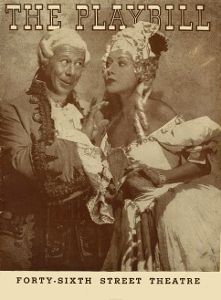
Margrethe Blossom Dearie was an American jazz singer and pianist. She had a recognizably light and girlish voice. Dearie performed regular engagements in London and New York City over many years and collaborated with many musicians, including Johnny Mercer, Miles Davis, Jack Segal, Johnny Mandel, Duncan Lamont, Bob Dorough, Dave Frishberg, and Jay Berliner.
"All of You" is a popular song written by Cole Porter and published in 1954.

Du Barry Was a Lady is a Broadway musical, with music and lyrics by Cole Porter, and the book by Herbert Fields and Buddy DeSylva. The musical starred Bert Lahr, Ethel Merman and Betty Grable, and the song "Friendship" was one of the highlights. The musical was made into a 1943 Technicolor film Du Barry Was a Lady, starring Red Skelton, Lucille Ball, Gene Kelly and Tommy Dorsey and his orchestra.

Ben Bagley was an American musical producer and record producer.
"Wait till You See Her" is a popular song. The music was written by Richard Rodgers, the lyrics by Lorenz Hart.
"Always True to You in My Fashion" is a 1948 show tune by Cole Porter, written for the musical Kiss Me, Kate. It is based on Non Sum Qualis Eram Bonae sub Regno Cynarae, a similarly ironic poem by the English Decadent poet Ernest Dowson (1867–1900), which has the refrain 'I have been faithful to thee, Cynara! in my fashion,' and which was probably inspired by Dowson's lifelong friend Adelaide Foltinowicz, who never returned his devotion. The phrase "faithful in my fashion" entered the language before the song was written, and was the title of a 1946 Hollywood film.
"The Riviera" is a song written and composed by Cy Coleman and Joseph Allen McCarthy in 1953. The song was intended for the John Murray Anderson's Almanac revue, but was instead picked up by cabaret singer Mabel Mercer and included in her album Songs by Mabel Mercer, Vol. 3 (1953). The version probably best known is that performed by Blossom Dearie on her album Give Him the Ooh-La-La (1958).
"All Through the Night" is a 1934 popular song written by Cole Porter for his 1934 musical Anything Goes. The melody's distinguishing characteristic is a descending chromatic scale, starting on the third, interrupted by an octave leap after four bars. It was introduced by William Gaxton and Betina Hume. Hit versions in 1935 were recorded by Paul Whiteman and by Harry Rosenthal.

Give Him the Ooh-La-La is a 1958 studio album by American jazz singer Blossom Dearie.
"Down in the Depths (on the Ninetieth Floor)" is a torch song written by Cole Porter, for his 1936 musical Red, Hot and Blue, in which it was introduced by Ethel Merman. The lyric scheme juxtaposes images of high and low. It is a lament from the point of view of a rich woman in a penthouse apartment higher than any building but the Empire State Building, who looks down on the busy city life below her but nevertheless feels she is at the lowest and poorest point of her life because she is lonely. Porter's melody is musically intertwined with the lyric scheme in a similar manner to his song "Ev'ry Time We Say Goodbye."
"Just in Time" is a popular song with the melody written by Jule Styne and the lyrics by Betty Comden and Adolph Green. It was introduced by Judy Holliday and Sydney Chaplin in the musical Bells Are Ringing in 1956. Judy Holliday and Dean Martin sang the song in the 1960 film of Bells Are Ringing. Martin then recorded it for his 1960 album, This Time I'm Swingin'!. Tony Bennett recorded the song in 1956 and continued performing it until his retirement, at Radio City Music Hall, in 2021 at the age of 95.
"Do I Love You?" is a 1939 popular song written by Cole Porter, for his musical Du Barry Was a Lady, where it was introduced by Ronald Graham and Ethel Merman.
"I Am in Love" is a 1953 popular song written by Cole Porter, for his musical Can-Can, where it was introduced by Peter Cookson.
"From This Moment On" is a 1950 popular song written by Cole Porter, which has since become a jazz standard. It was originally written for the 1950 musical Out of This World, but director George Abbott dropped it from the musical before its Broadway premiere, possibly due to lackluster singing by cast member William Eythe. It was then included in MGM's 1953 film Kiss Me Kate, an adaptation of Porter's stage musical Kiss Me, Kate when it was sung by Ann Miller, Tommy Rall, Bob Fosse and Bobby Van. In theatrical versions of Kiss Me, Kate it goes now as a duet of Harrison Howell and Lilli Vanessi.
"Ridin' High" is a 1936 popular song written by Cole Porter, for his musical Red, Hot and Blue, where it was introduced by Ethel Merman.
"Ev'rything I've Got" is a show tune from the Rodgers and Hart musical By Jupiter (1942), in which it was introduced by Ray Bolger and Benay Venuta.
"I Hear Music" is a popular song composed by Burton Lane, with lyrics by Frank Loesser for the Paramount Pictures movie Dancing on a Dime (1940). In the film it was performed by Robert Paige, Peter Lind Hayes, Frank Jenks and Eddie Quillan.
"The Sweetest Sounds" is a popular song, with words and music written by Richard Rodgers for the 1962 musical No Strings. The song opens and closes the show for characters Barbara Woodruff and David Jordan, performed by Diahann Carroll and Richard Kiley in the original Broadway theatre production and subsequent cast recording.
"Soon It's Gonna Rain" is a song from the musical comedy The Fantasticks, with lyrics written by Tom Jones, and music composed by Harvey Schmidt.
Give Him the Ooh-La-La may refer to:



